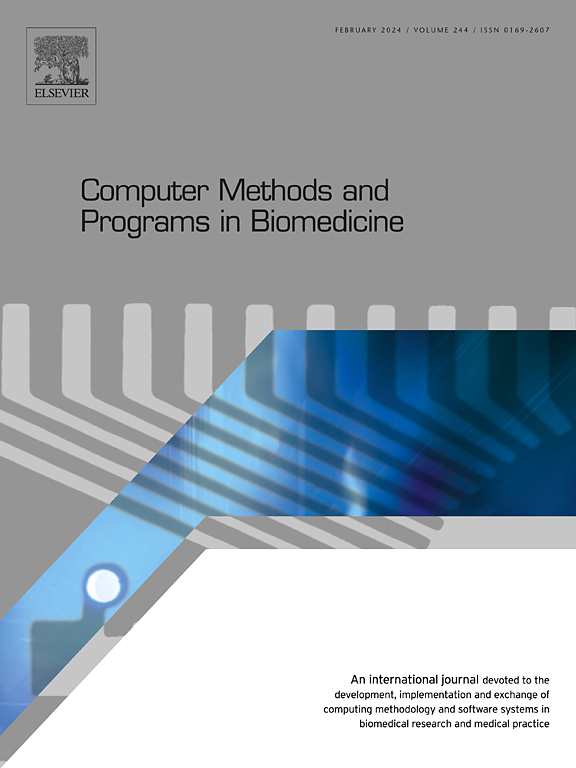Smart monitoring solution for dengue infection control: A digital twin-inspired approach
IF 4.9
2区 医学
Q1 COMPUTER SCIENCE, INTERDISCIPLINARY APPLICATIONS
引用次数: 0
Abstract
Background and Objective:
In the realm of smart healthcare, precise monitoring and prediction services are crucial for mitigating the impact of infectious diseases. This study introduces an innovative digital twin technology-inspired monitoring architecture that employs a similarity-based hybrid modeling scheme to significantly enhance accuracy in the smart healthcare domain. The research also delves into the potential of IoT technology in delivering advanced technological healthcare solutions, with a specific focus on the rapid expansion of dengue fever.
Methods:
The proposed digital twin-inspired healthcare system is designed to proactively combat the spread of dengue virus by enabling ubiquitous monitoring and forecasting of individuals’ susceptibility to dengue infection. The system utilizes digital twin technology to observe the status of healthcare and generate likely predictions about the vulnerability to the virus by employing k-means Clustering and Artificial Neural Networks.
Results:
The proposed system has been validated and its effectiveness has been demonstrated through experimental evaluation using carefully defined methods. The results of the experimental assessment confirm that the system performs optimally in terms of Temporal Delay (14.15 s), Classification Accuracy (92.86%), Sensitivity (92.43%), Specificity (91.52%), F-measure (90.86%), and Prediction Effectiveness. Moreover, by integrating a hybrid model that corrects errors in physics-based predictions employing a model for error correction driven by data, this approach has demonstrated a noteworthy 48% reduction in prediction errors, particularly in health monitoring scenarios.
Conclusions:
The digital twin-inspired healthcare system proposed in this study can assist healthcare providers in assessing the health vulnerability of the dengue virus, thereby reducing the likelihood of long-term or catastrophic health consequences. The integration of a hybrid modeling approach and the utilization of IoT technology has shown promising results in enhancing the accuracy and effectiveness of smart health monitoring and prediction services.
登革热感染控制的智能监测解决方案:受数字孪生启发的方法。
背景与目标:在智能医疗领域,精确的监测和预测服务对于减轻传染病的影响至关重要。本研究介绍了一种受数字孪生技术启发的创新监测架构,该架构采用基于相似性的混合建模方案,可显著提高智能医疗保健领域的准确性。研究还深入探讨了物联网技术在提供先进技术医疗解决方案方面的潜力,并特别关注登革热的迅速蔓延:受数字孪生启发而提出的医疗保健系统旨在通过实现对个人登革热感染易感性的无处不在的监测和预测,积极防治登革热病毒的传播。该系统利用数字孪生技术观察医疗保健状况,并通过使用 k-means 聚类和人工神经网络生成对病毒易感性的可能预测:通过使用精心定义的方法进行实验评估,验证了拟议系统的有效性。实验评估结果证实,该系统在时间延迟(14.15 秒)、分类准确率(92.86%)、灵敏度(92.43%)、特异性(91.52%)、F-measure(90.86%)和预测效果等方面均表现最佳。此外,通过整合一个混合模型,利用数据驱动的纠错模型纠正基于物理的预测中的错误,该方法显著减少了48%的预测错误,尤其是在健康监测场景中:本研究提出的受数字孪生启发的医疗保健系统可以帮助医疗保健提供者评估登革热病毒的健康脆弱性,从而降低长期或灾难性健康后果的可能性。将混合建模方法与物联网技术相结合,在提高智能健康监测和预测服务的准确性和有效性方面取得了可喜的成果。
本文章由计算机程序翻译,如有差异,请以英文原文为准。
求助全文
约1分钟内获得全文
求助全文
来源期刊

Computer methods and programs in biomedicine
工程技术-工程:生物医学
CiteScore
12.30
自引率
6.60%
发文量
601
审稿时长
135 days
期刊介绍:
To encourage the development of formal computing methods, and their application in biomedical research and medical practice, by illustration of fundamental principles in biomedical informatics research; to stimulate basic research into application software design; to report the state of research of biomedical information processing projects; to report new computer methodologies applied in biomedical areas; the eventual distribution of demonstrable software to avoid duplication of effort; to provide a forum for discussion and improvement of existing software; to optimize contact between national organizations and regional user groups by promoting an international exchange of information on formal methods, standards and software in biomedicine.
Computer Methods and Programs in Biomedicine covers computing methodology and software systems derived from computing science for implementation in all aspects of biomedical research and medical practice. It is designed to serve: biochemists; biologists; geneticists; immunologists; neuroscientists; pharmacologists; toxicologists; clinicians; epidemiologists; psychiatrists; psychologists; cardiologists; chemists; (radio)physicists; computer scientists; programmers and systems analysts; biomedical, clinical, electrical and other engineers; teachers of medical informatics and users of educational software.
 求助内容:
求助内容: 应助结果提醒方式:
应助结果提醒方式:


